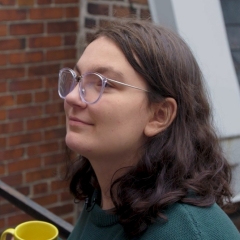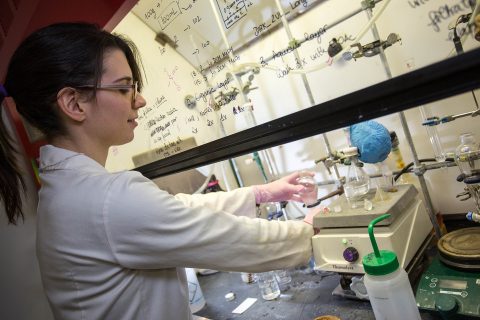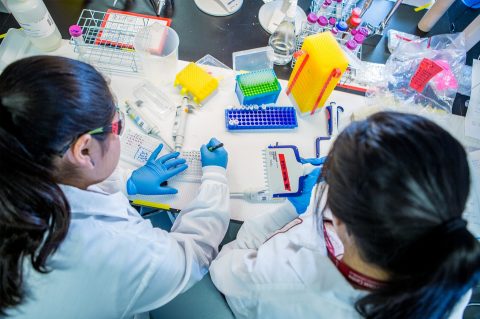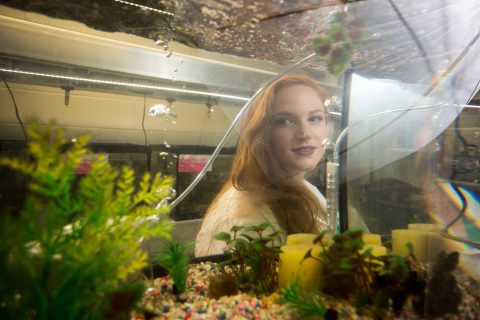Cell and Molecular Biology (BSc)
Virtual information sessions
Discover what makes Concordia's Faculty of Arts and Science stand out as a leader in the humanities and social and natural sciences, including academic opportunities, hands-on learning and how to achieve your goals.
Why study Cell and Molecular Biology?
Map genes. Examine microbes. Crack the secrets of the genome, the program of life. When you study Cell and Molecular Biology, you get a front-row seat to study the basic processes that run life’s playbook. As a cell and molecular biologist, you can discover how genes shape organisms, how immune cells protect our body and how biotechnology can develop pest- or drought-resistant crops for the developing world.
Our Biology Department laboratories feature modern equipment and protocols that introduce you to state-of-the-art technologies for cell physiology and molecular biology. Small class sizes foster strong student-professor relationships. As a Cell and Molecular Biology student, you'll follow both the biology core curriculum and courses focused within your specialization. Through labs, lectures and tutorials you will:
- Study the mechanisms of cellular interactions and genetic controls in plants and animals
- Study the structure and function of microbes
- Learn the techniques used to study genetic function, gene mapping and genome analysis
- Perform original research as an undergraduate
Concordia’s hands-on approach provides a solid foundation for a career in the life and health sciences or paves the way for future graduate studies.
Special funding for out-of-province students
Up to $4000 for undergraduate programs.
Program structure
A Bachelor of Science degree takes a minimum of three or four years (90 – 120 credits) of full-time study, depending on your academic background.
Program options
- Honours in Cell and Molecular Biology (72 credits)*
- Specialization in Cell and Molecular Biology (66 credits)
*Honours is a highly concentrated program, ideal for students planning to continue to graduate studies. If you are interested in Honours, speak with your program advisor in your first year of study at Concordia. Students applying to the University are able to apply to the specialization.
Courses
Co-op program
The Co-op program gives you the chance to complete paid work terms that last 12 to 16 weeks. Work positions are available in industry, national and provincial research institutes, health organizations and universities located throughout Canada.
United States students: A U.S. Federal Student Aid-eligible version of this program is offered. This version meets all U.S. regulations (such as no co-operative education or e-courses) for eligible programs.
Admission criteria
Minimum cut-off averages and course requirements
- Quebec CEGEP: 26
- Calculus 1 and Calculus 2 – Mechanics, Electricity and Magnetism and Wave, Optics and Modern Physics – General Chemistry and Chemistry of Solutions – General Biology OR Natural Science DEC OR DEC intégré en sciences, lettres et arts.
- Additional information for CEGEP applicants
- High School: B- overall, B- in math / sciences
- Completed courses in the disciplines of Calculus, Biology, Chemistry and Physics.
- One math from Pre-Calculus, Calculus, or equivalent
- Two sciences (from Biology, Chemistry or Physics)
- ACT or SAT is NOT required
- Canadian curricula course requirements
- Accepted international qualifications
- Completed courses in the disciplines of Calculus, Biology, Chemistry and Physics.
- International Baccalaureate (IB) diploma: 27 overall, 4 math, 4 science
- one math (Applications and Interpretations HL, Analysis and Approaches HL or Analysis and Approaches SL)
- one science (Physics, Chemistry or Biology, either SL or HL)
- one of the science or math courses must be completed at the HL level
- International Baccalaureate Career-related Programme (CP): 27 overall, 4 math, 4 science
- Same as International Baccalaureate Diploma Programme (DP) requirements
- Additional Career-related Programme (CP) course requirements
- Baccalauréat français: 12 overall, 12 in math / science
- Première: Spécialité mathématiques AND Spécialité physique-chimie
Terminale: Spécialité mathématiques (also accepted, Spécialité Physique-Chimie AND Mathématiques Complémentaires)
- Première: Spécialité mathématiques AND Spécialité physique-chimie
- British system of education (GCE):
- A-levels: At least two A-level exams CD, C in math, C in science or
- AS-levels: At least 4 AS-level exams with equivalent results or
- BTEC: Level 3 Diploma or Extended Diploma in a related subject area with equivalent results
- Students without math or science A-levels may be admissible based on AS-level or iGCSE/GCSE/O-Level exam results. Students should include all their exam results from iGCSE (or equivalent) onwards to support their application.
- Additional information for British System of Education (GCE) applicants
- University Transfers (internal/external): C+ overall, C+ in math / sciences
- Completed courses in the disciplines of Calculus, Biology, Chemistry and Physics.
Minimum cut-off averages should be used as indicators. The cut-off data may change depending on the applicant pool. Applicants who meet the stated minimum requirements are not guaranteed admission to these programs.
Application deadlines
It’s not too late to apply
Most undergraduate programs are still accepting applications for fall 2025.

FALL ENTRY (September)
Deadline: March 1
International applicants: Apply no later than February 1 to allow time for immigration document processing. However, applying earlier is strongly recommended. Immigration processing times vary by country, and delays could prevent you from starting your studies on time.

WINTER ENTRY (January)
Deadline: November 1
International applicants: Apply no later than August 1 to allow time for immigration document processing. However, applying earlier is strongly recommended. Immigration processing times vary by country, and delays could prevent you from starting your studies on time.
We reserve the right to close admission to a program at any time after the official deadline without prior notice.
Student stories

Scarlet Guy
Bachelor of Arts Honours History: Public History
Find out how Scarlet Guy discovers a world of interdisciplinary learning and community support in the Faculty of Arts and Science.
Other programs of interest

As a biochemist, you will study the chemical processes that occur within the cells of living organisms.
Department
Department of Chemistry and Biochemistry
Faculty

Get inspired by life. Immerse yourself in the study of life at all levels: from the edge of biochemistry through cell biology and the physiology of multicellular organisms to the interactions between organisms and their environment.
Department
Faculty

As an ecologist, you will explore the connections among different organisms and their interaction with soil, air, water, and radiation from the sun.
Department
Faculty


